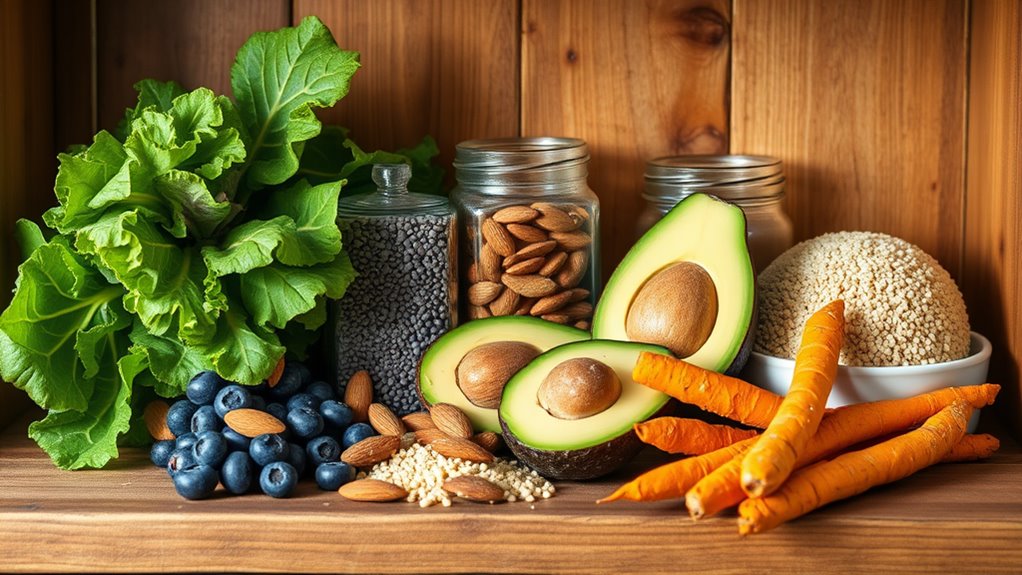7 Superfoods That Deserve a Spot in Your Pantry
You’ve likely wondered which superfoods can upgrade your pantry for better health. Quinoa delivers complete proteins, chia seeds offer omega-3s and fiber, while kale, blueberries, salmon, turmeric, and avocados provide essential nutrients and antioxidants. Incorporating them supports your well-being, so see how they’ll transform your everyday meals.
Quinoa
Quinoa packs a nutritional punch as a gluten-free grain that’s complete with all nine essential amino acids, making it a pantry staple for balanced meals.
You’ll spot it on every superfood list for its protein-packed profile, which supports muscle repair and energy.
Use it in your daily routines—cook it as a base for bowls or sides—to maximize its fiber and mineral benefits practically. Additionally, quinoa is rich in antioxidants and vitamins, which can help reduce inflammation and promote overall health.
Chia Seeds
Like quinoa, chia seeds bring another layer of nutrition to your pantry as tiny seeds packed with omega-3 fatty acids, fiber, and protein. You’ll improve your diet by incorporating them into meals like puddings or salads for better heart health and digestion. Additionally, chia seeds are considered a superfood for anti-inflammatory health, making them a great addition to your diet.
| Nutrient | Per 1 oz Serving | Health Benefits |
|---|---|---|
| Omega-3 Fatty Acids | 5g | Supports heart health |
| Fiber | 11g | Aids digestion |
| Protein | 4g | Builds muscle |
| Antioxidants | High | Reduces inflammation |
Kale
You gain essential nutrients from kale, such as vitamins A, C, and K, which boost your immune system and promote bone health. Additionally, kale is rich in essential nutrients that many people overlook, making it a powerhouse for your overall well-being. You can incorporate kale into your meals in versatile ways, like tossing it into salads, blending it into smoothies, or sautéing it as a side. This makes it easy for you to add these benefits to your daily routine while experimenting with new recipes.
Nutrient Benefits
Kale stands out as a nutrient-dense superfood, delivering high levels of vitamins A, C, and K that bolster your immune system and bone health.
It’s also packed with calcium to strengthen your bones, iron to enhance oxygen transport in your blood, potassium to regulate blood pressure, antioxidants to fight oxidative stress, and fiber to support digestive regularity.
Versatile Uses
In addition to its nutrient-packed profile, kale adapts effortlessly to various dishes, letting you toss it raw into salads for crispness, blend it into smoothies for a nutrient boost, or sauté it in stir-fries for a hearty, flavorful addition.
- Add it to soups for extra nutrients and texture.
- Bake into chips for a crunchy, healthy snack.
- Blend into pesto for a nutritious twist on basics.
- Steam as a quick side for everyday meals.
Blueberries
You gain significant antioxidant benefits from blueberries, which research shows can reduce inflammation and support heart health.
Their nutrient profile boasts high levels of vitamins C and K, along with fiber that aids your digestive system. Additionally, blueberries are known for their ability to enhance cognitive sharpness, making them a great addition to your diet.
Try simple recipe ideas like adding them to yogurt or baking them into muffins for everyday meals.
Antioxidant Benefits
Blueberries stand out as a pantry staple due to their high antioxidant content, particularly anthocyanins, which actively neutralize free radicals and reduce oxidative stress in your body.
-
You’ll protect your heart by consuming blueberries, as research links anthocyanins to reduced inflammation markers.
-
They help combat aging signs, with studies showing antioxidants preserve skin elasticity.
-
Incorporate them into meals to enhance brain health, evidenced by improved memory in trials.
-
Use frozen blueberries to maintain antioxidant levels, ensuring daily intake fights cellular damage effectively.
Nutrient Profile
Beyond their vibrant color and flavor, blueberries deliver a wealth of essential nutrients that enhance overall health.
You’ll get ample vitamin C to boost your immune function, vitamin K for strong bones and blood clotting, fiber for smooth digestion, and manganese for efficient metabolism.
These nutrients pack a punch in every serving, making blueberries a practical health ally.
Recipe Ideas
While their nutrient-packed profile makes blueberries a health staple, integrating them into everyday recipes enhances both flavor and benefits.
You’ll find these practical ideas easy to incorporate into your routines for maximum benefits:
- Blend fresh blueberries into your morning smoothie for an antioxidant-rich start.
- Sprinkle fresh blueberries on yogurt to boost your fiber and vitamin intake.
- Bake blueberries into muffins for a delicious and nutrient-dense snack.
- Mix blueberries into salads for a fresh, vitamin-packed addition.
Salmon
Salmon packs a nutritional punch as a superfood, delivering omega-3 fatty acids that support heart health and reduce inflammation.
You’ll boost your diet by choosing fresh or canned options; it’s loaded with protein and vitamin D for strong bones and energy.
Grill it for quick meals or add to salads—aim for two servings weekly to enhance brain function and lower chronic disease risk. Additionally, incorporating key nutrients from foods like salmon can significantly improve your overall immune function.
Turmeric
Turmeric, a vibrant yellow spice derived from a root, packs a powerful anti-inflammatory punch through its key compound, curcumin, which offers antioxidant benefits and supports joint health. Research backs its role in boosting immunity and digestion. Studies have shown that an anti-inflammatory diet can be significantly enhanced by incorporating turmeric into your daily routine.
- Add it to your meals for daily anti-inflammatory effects.
- Pair it with black pepper to enhance curcumin absorption.
- Brew it into tea for improved gut health.
- Incorporate it in smoothies to support overall wellness.
Avocados
Avocados pack a nutrient-dense punch, offering heart-healthy monounsaturated fats that help reduce bad cholesterol and support overall cardiovascular function.
They’re rich in potassium for blood pressure regulation and fiber for digestion.
You’ll boost nutrient intake by adding them to salads or smoothies; their creamy texture enhances meals while aiding weight management through satiety.


